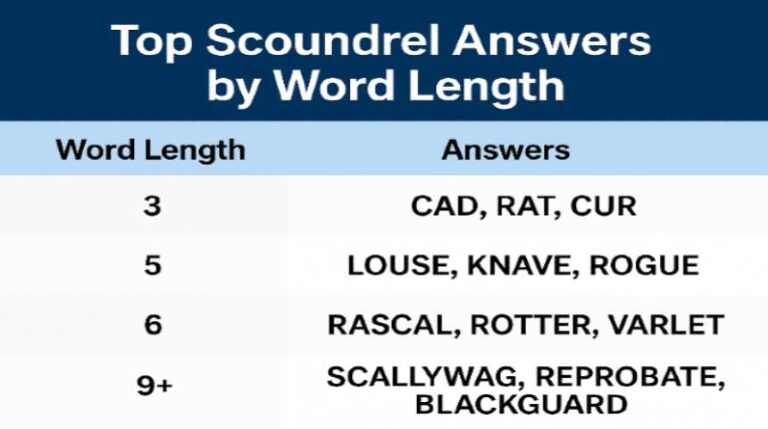Introduction
Crossword puzzles are a timeless form of entertainment, offering both challenge and satisfaction. Yet, certain clues often stump even experienced solvers. One such clue is “Scoundrel”, a word that carries a colorful history of synonyms and cultural uses. While some answers are short and simple, others are more obscure or literary. Understanding the range of possible answers—and the reasoning behind them—can significantly improve your crossword-solving skills.
In this guide, we’ll explore the most common and rare solutions for the clue scoundrel, examine how answer length and puzzle style matter, and provide tips to crack such tricky clues quickly.
What Does “Scoundrel” Mean in Crosswords?
In everyday English, a scoundrel refers to a dishonorable, deceitful, or morally corrupt person. In crossword puzzles, however, this clue is less about the definition and more about matching synonyms that fit the grid pattern and word length.
For example:
- 3 letters → RAT, CAD, CUR
- 5 letters → LOUSE, KNAVE, ROGUE
- 6 letters → ROTTER, RASCAL, VARLET
- 9+ letters → SCALLYWAG, REPROBATE, BLACKGUARD
Crossword constructors love this clue because it can yield a wide variety of answers, from everyday insults to archaic or playful synonyms.
Top Answers for “Scoundrel” Clue
Different crossword databases rank solutions by frequency and likelihood. Here are the most common answers, based on multiple puzzle sources:
| Rank | Answer | Letters | Notes |
| 1 | LOUSE | 5 | Most frequently used in US puzzles |
| 2 | CAD | 3 | Classic short synonym, often used in quick crosswords |
| 3 | RAT | 3 | Suggests betrayal or untrustworthiness |
| 4 | ROGUE | 5 | Popular in both UK and US puzzles |
| 5 | CUR | 3 | Archaic insult, still crossword-friendly |
| 6 | KNAVE | 5 | Medieval/archaic synonym, useful in themed grids |
| 7 | HEEL | 4 | Slang for an unscrupulous person |
| 8 | SOANDSO | 7 | Humorous, colloquial clue answer |
| 9 | SCALAWAG | 8 | US historical term, colorful but less common |
| 10 | BLACKGUARD | 10 | Long, dramatic, old-fashioned synonym |
Short vs. Long Answers: Why Length Matters
One reason “Scoundrel” is such a versatile crossword clue is that it works for both short-fill and long-fill answers.
- Short answers (3–5 letters) are more common because they’re easy to fit into tight grids. Examples: CAD, RAT, CUR, HEEL.
- Medium answers (5–7 letters) often show up in themed puzzles or midweek crosswords. Examples: ROGUE, KNAVE, RASCAL.
- Long answers (8–10 letters) like SCALLYWAG, REPROBATE, or BLACKGUARD appear less frequently, but they add flair and variety to puzzle grids.
For solvers, recognizing the puzzle’s letter count is crucial. If you’re solving a 5-letter scoundrel, the likely answer is LOUSE, ROGUE, or KNAVE—not BLACKGUARD.
Rare and Interesting Synonyms in Crosswords
While most crosswords stick to common synonyms, constructors sometimes surprise solvers with less obvious options. These include:
- VARLET – archaic word for servant, often used pejoratively.
- WRETCH – emphasizes misery and contempt rather than dishonesty.
- MISCREANT – formal term meaning evildoer, used in more advanced puzzles.
- VILLAIN – broad but occasionally used as a direct answer.
- PICARO – Spanish literary term for a rogue, rare but crossword-legal.
- LOSEL – old-fashioned word for a lazy or worthless person, now almost exclusively in crosswords.
These rarer terms remind us that crosswords are as much about vocabulary breadth as they are about logical deduction.
How to Solve “Scoundrel” Clues Effectively
1. Look at Word Length
Always start by counting the squares. A 3-letter “scoundrel” is almost always RAT, CAD, or CUR. A 10-letter slot hints at BLACKGUARD.
2. Consider Crossword Style
- American-style puzzles (e.g., New York Times) favor short, punchy synonyms like RAT, LOUSE, or ROGUE.
- British-style quick crosswords (e.g., Daily Mirror) may lean toward ROTTER, CAD, or KNAVE.
3. Use Crossing Letters
If you already have one or two letters from intersecting clues, you can quickly eliminate impossible options. For instance:
- “Scoundrel (5)” with R___E → ROGUE.
- “Scoundrel (3)” with A → CAD.
4. Watch for Tone or Humor
Clues sometimes play with tone. “Scoundrel!” with an exclamation point may indicate SOANDSO or STINKER, whereas a more formal clue may suggest MISCREANT or REPROBATE.
Why “Scoundrel” is a Crossword Favorite
What makes “Scoundrel” stand out is not just its definition but its rich linguistic diversity. From Shakespeare’s “knaves and varlets” to the playful “rascals and stinkers” of children’s books, the term spans centuries of English insults.
For crossword constructors, this variety means they can:
- Adjust difficulty (short vs. long answers).
- Add humor (SOANDSO, STINKER).
- Introduce cultural or historical flavor (BLACKGUARD, SCALAWAG, VARLET).
For solvers, it’s a reminder that crosswords are not just about definitions—they’re about cultural and linguistic history.
Common Mistakes to Avoid
- Overlooking uncommon synonyms: Many solvers stick only to RAT, CAD, and ROGUE. Remember that BADEGG, VARLET, and even LOSEL are fair game.
- Ignoring regional differences: UK solvers may encounter ROTTER or RASCAL more often, while US puzzles prefer LOUSE or HEEL.
- Not double-checking the letter count: The difference between ROGUE (5) and RASCAL (6) is crucial.
Conclusion
The clue “Scoundrel” is a crossword classic because it draws on a vast pool of synonyms—short, long, humorous, archaic, and literary. From quick 3-letter fillers like RAT to flamboyant 10-letter options like BLACKGUARD, it challenges solvers to think broadly and creatively.
The next time you encounter “Scoundrel” in a crossword, remember: don’t just default to RAT or CAD. Scan the word length, look at your crossings, and consider the puzzle’s tone. You may discover an old-fashioned insult you’ve never used before—but that’s the beauty of crosswords.
FAQs About the Scoundrel Crossword Clue
Q1: What is the most common crossword answer for “Scoundrel”?
A: The most frequent answers are LOUSE, RAT, and CAD, depending on puzzle style.
Q2: Why are there so many possible answers for this clue?
A: Because “scoundrel” has dozens of synonyms in English, from colloquial to archaic, and crossword setters love to use them.
Q3: How can I tell which answer fits my puzzle?
A: Look at the letter count and crossing words. For example, a 5-letter scoundrel is likely ROGUE or LOUSE, not SCALAWAG.
Q4: Are some answers outdated or rare?
A: Yes. Words like VARLET, LOSEL, and PICARO are rarely used in everyday language but appear in crosswords for variety.
Q5: Which publications use “Scoundrel” most often?
A: It appears in popular puzzles like The New York Times, LA Times, Universal, Daily Mirror, and Daily Themed Crossword.
For more insightful articles and the latest updates, keep visiting Hacoo.

